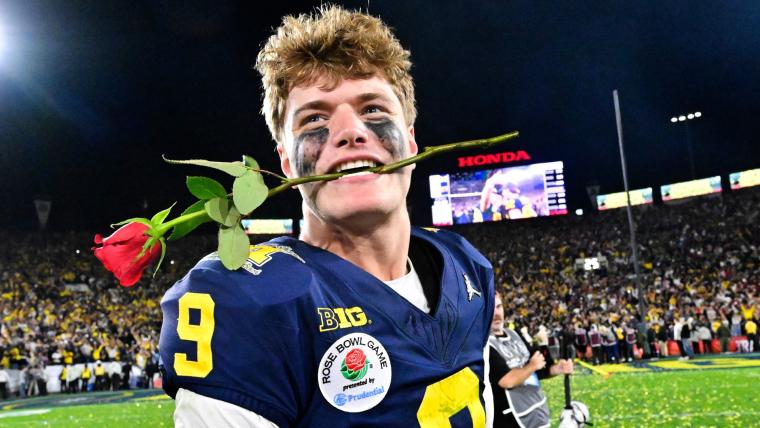

Three hours before the Michigan Wolverines faced off against the Washington Huskies in the College Football National Championship game on Monday, you might have noticed starting quarterback J.J. McCarthy sitting on the field with his back to the goal post—legs crisscrossed, shoes off, number-9 hood up, and eyes closed.
McCarthy has meditated for around 10 minutes before each Michigan game, as well as 30 to 40 minutes each morning, according to MLive. He also listens to Bob Marley songs before games.
“I meditate before the game just to really get my mindset into that calmness, that emptiness where I can allow things to happen and react from a higher perspective instead of reacting from just straight impulse,” McCarthy has stated about his regular meditation practice. Head coach Jim Harbaugh declared the 20-year-old the all-time best quarterback in Wolverine history, and he led the team to victory for the first game since 1997.
McCarthy turned to the practice during his senior year at the IMG Academy boarding school in Florida when he became despondent.
“I just kept drifting further and further away from myself and my true nature, and I felt like I was in a deep rut for about a month or two, and I thought something had to change.” “This isn’t who I am,” McCarthy stated during a press conference on how he started meditating. “I began researching various practices to help improve mental health, and meditation was the first one that kept coming up.” I just gave it a shot, and the rest is history.”
As numerous local and national sites have reported, it’s unusual to see a team’s top quarterback focused on something other than the football during warmups. McCarthy’s meditation technique, which he credits with centering him and preparing him for success, must include some magic.
“I was always studying all these athletes, studying their mindsets, trying to adopt them in every way to forge the ultimate mindset as a competitor,” McCarthy previously stated about coming up with new ways to rise to the occasion and prioritize his mental health.

What are the advantages of meditation?
Meditation is recommended by both mental health professionals and scientists to help relax the nervous system and lessen emotions of tension and anxiety. Consider it spending a tiny amount of time to breathe and be alert, allowing fleeting ideas to come and go like clouds in the sky or train cars on their way to the next stop.
Meditation can assist people in regulating their emotions and gaining a broader perspective. Slowly breathing and limiting distractions can help to reduce the pulse rate and foster a sense of calm. Meditation is essential for getting into the zone, or what McCarthy refers to as “tune-up” time.
“You’re teaching yourself to be non-judgmentally aware of the present moment,” said Elizabeth Seng, an associate professor of psychology at Yeshiva University’s Ferkauf Graduate School of Psychology. “We want them to be more focused on what’s going on right now than regretting what happened in the past or worrying about what will happen in the future.”

While it’s easy to neglect mental fitness routines in the midst of battle, McCarthy’s concentrated time shows how the practice serves a greater benefit beyond those 10 focused minutes—perhaps leading to an undefeated college football season. It’s also why sporting teams invest more in mental health coaches and competition psychology classes, which attracts greater attention to the mental toughness required to win.
“I want to spread the practice throughout the world.” “I want kids to look up to me and say, ‘Hey, let me try this out,’ and see it for themselves,” McCarthy said in a Michigan Football team video.

Leave a Reply